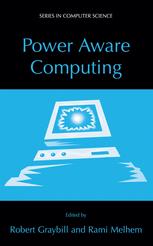

Most ebook files are in PDF format, so you can easily read them using various software such as Foxit Reader or directly on the Google Chrome browser.
Some ebook files are released by publishers in other formats such as .awz, .mobi, .epub, .fb2, etc. You may need to install specific software to read these formats on mobile/PC, such as Calibre.
Please read the tutorial at this link: https://ebookbell.com/faq
We offer FREE conversion to the popular formats you request; however, this may take some time. Therefore, right after payment, please email us, and we will try to provide the service as quickly as possible.
For some exceptional file formats or broken links (if any), please refrain from opening any disputes. Instead, email us first, and we will try to assist within a maximum of 6 hours.
EbookBell Team

5.0
58 reviewsWith the advent of portable and autonomous computing systems, power con sumption has emerged as a focal point in many research projects, commercial systems and DoD platforms. One current research initiative, which drew much attention to this area, is the Power Aware Computing and Communications (PAC/C) program sponsored by DARPA. Many of the chapters in this book include results from work that have been supported by the PACIC program. The performance of computer systems has been tremendously improving while the size and weight of such systems has been constantly shrinking. The capacities of batteries relative to their sizes and weights has been also improv ing but at a rate which is much slower than the rate of improvement in computer performance and the rate of shrinking in computer sizes. The relation between the power consumption of a computer system and it performance and size is a complex one which is very much dependent on the specific system and the technology used to build that system. We do not need a complex argument, however, to be convinced that energy and power, which is the rate of energy consumption, are becoming critical components in computer systems in gen eral, and portable and autonomous systems, in particular. Most of the early research on power consumption in computer systems ad dressed the issue of minimizing power in a given platform, which usually translates into minimizing energy consumption, and thus, longer battery life.